- Home
- Susanna Kearsley
Named of the Dragon Page 4
Named of the Dragon Read online
Page 4
The resemblance between the brothers really was quite striking, I thought, looking at him. They shared the same blue eyes, the same dark golden hair that my mother had once termed "British blond," the same angular jaw and the same dashing smile that displayed teeth so perfectly straight one could hardly believe they were natural. But Christopher, I decided, was the younger by at least five years.
His eyes were still on Bridget, assessing her, trying to charm.
"When James told me he'd invited a fellow writer for the holidays," he said, "I must admit I didn't think he meant someone like you."
She smiled. "You were expecting tweeds and brogues, then, were you?"
"Not really. Some tall, gaunt creature dressed in black, with granny glasses and a fringe, perhaps."
"Sorry to disappoint."
"Not at all." He turned to me. "You're going to think me awfully rude, I know, but I'm afraid I've forgotten your name."
I was used to that, in Bridget's company. "It's Lyn. Lyn Ravenshaw."
"My agent," Bridget added. "Although I suppose she doesn't fit your image of a literary agent, either."
"On the contrary." He looked me up and down. "She looks exactly as an agent ought to look."
I sipped my tea, amused. "Is that a good thing or a bad thing?"
But he'd already returned his attention to my more entrancing client. "You write children's books, James said. That must be fun."
"I'm not sure any form of writing can be called 'fun', " said Bridget. "Fulfilling, yes. Enjoyable, yes. Bloody hard work, definitely." She took another sandwich to replace the one she'd eaten. "I take it you don't write, yourself?"
Christopher shook his head. "No, I'm not as clever as my brother. Can't even scribble a sentence."
"So what do you do?"
"Antiques," he said. "I have a shop in Bath."
She glanced up, intrigued. "Do you?" She'd always had a weakness for antiques. But Christopher, not knowing this, failed to take full advantage of his opportunity. Instead he shrugged and played the matter down.
"Not nearly as exciting as a writer's life, I shouldn't think. I feel quite dull, compared with you lot."
Watching him smile, I had a suspicion that Christopher Swift never thought himself dull. His ego would never have permitted it.
To me, he said, "You and I are the odd ones out, you know. There seem to be more writers down here in Angle than locals."
I saw a chance to satisfy my earlier curiosity. "Yes, Bridget did say you had a playwright here, as well, but I didn't catch the name ..."
"Was that a car?" asked Bridget, tipping her head to listen.
Christopher stopped, and listened, too. "I don't hear anything."
"My mistake."
"Now what were you asking ... ?"
"The playwright," I prompted him, ignoring Bridget.
"Oh right." He nodded, picking up the thread of conversation. "Well, you'll have heard the name, of course— he's rather more famous than my brother, and a good thing too, because old James is vain enough already—"
A new voice interrupted from the back door; a cultured male voice, instantly identifiable. "That's slander, that is." He let the kitchen door swing closed again behind him as he came into the warmth, his blue eyes finding Bridget first, then Christopher, and finally coming to rest on me. "Miss Ravenshaw, I presume." The familiar smile flashed, as James Swift came across to greet me, offering a hand streaked with red from the afternoon's shooting. "Don't mind the blood," he said. "I've just committed murder."
V
And after that, she set herself to gain
Him, the most famous man of all those times.
Alfred, Lord Tennyson, "Merlin and Vivien"
I had heard others talk about the magnetism of the man, A but even having been forewarned, I fell victim to it now, myself. He was shorter than his brother, and stockier, with the same handsome features less carefully drawn, as though they'd been formed by a hastier hand. That didn't surprise me. James Swift's appetites—for food, for drink, for women—were legendary, and now that he was nearing forty he'd begun to pay the price of self-indulgence, the once-sharp lines of jaw and cheekbone thickening and growing faintly softer, heavier. He must have seen the change himself, because he'd grown a beard since I'd last seen him interviewed on television—a closely trimmed dark beard that made a rakish contrast to the waving lion's mane of golden hair that touched his collar at the back.
He tossed that hair now, casually, and smiled, and gave me back my hand. "You don't look fierce at all," he said. Then, over my shoulder, he told Bridget: "My love, I can't battle with this one. I might do her damage."
"Don't you believe it," said Bridget. Grinning, she reached for another sandwich and drew one leg up underneath her on the chair. "She scares my publisher to death, you know. The only reason he gives me those obscene advances is because he's terrified of saying 'no' to Lyn. He did it once, in the beginning," she revealed, with a sympathetic shake of her head, "and he's never been the same man since."
"You don't say." James Swift took a second, more piercing look at my innocent face before bending to the sink to wash his hands. "Bridget's told you, I'd imagine, that I've fallen out with Ivor."
I nodded. "Yes, she did mention you weren't entirely happy."
"Is that how she said it? She puts things so politely." Turning off the taps, he moved to dry his hands on the tea towel. "The truth is that we nearly came to blows last time we met, but then I don't need to tell you what Ivor's like," he said, turning to face me. "You worked for him, didn't you?"
Yes, I had worked for the great Ivor Whitcomb. Ivor was the Goliath of the London literary scene—an older agent, powerful, abrasive, and a man who'd frightened me to death when I'd first come to work for him. He'd all but engineered my marriage. Martin Blake had been his blue-eyed boy, his favourite client, and in Ivor's eyes I had become the one responsible for Martin's self-indulgences, his early death. If I had been a better wife to Martin, he'd once told me, Martin would have been at home that night, instead of driving home from God knows where so drunk he couldn't see the road. I hadn't let the accusations bother me—Ivor was simply the sort of boss that one endured and, after all, his pay was good. But I could never forgive him for the things he'd said my first day back, just after losing Justin. How he'd said it was my fault for being thoughtless, for not giving up my riding like Martin had told me to. Not a word of consolation, not the smallest show of sympathy. I'd posted out my CVs that afternoon.
I looked at James now, and answered him. "That's right. I was with Ivor three years, before Simon Holland."
Bridget smiled. "Lyn thinks that it's unethical to try to sign you up, James, while you're still on Ivor's list."
"Really?" The beard gave his smile a roguish edge. "Unethical, maybe. Impossible, no. Are there any sandwiches left?"
Christopher, who'd been leaning indolently in his doorway, fading with the ease of long habit into the wings while his brother made his entrance, now brought himself forward again, not challenging for centre stage, but staying in the circle of the spotlight. "Didn't they feed you up at the Hall?" he asked, pushing the sandwiches nearer to James. "Or doesn't one feed hunters?"
"Dulls the instinct, do you mean?" His brother smiled. "No, actually they fed us rather well, but that was hours ago. I've walked the whole of the estate, since then. At least," he qualified his statement, stretching his back, "it feels as if I have."
"You're out of shape, that's all," said Bridget, cheerfully. "It's like I told you—you can't sit all day and scribble and expect to keep in trim. You have to exercise."
"You don't," he countered.
"Yes, but then I have a rather high metabolism." Shrugging, she helped herself to the biscuits. "Energy to spare. And I write all my books while pacing back and forth across my sitting-room, I'm never still. Whereas you," she told him, watching while he took the chair beside her, "sit there like a lump, for hours on end. It can't be healthy."
"Writer
s, my dear girl, are made to die young. All the famous ones do. Which reminds me," he said, "who were all of you discussing when I came in? This person who's rather more famous than me?"
"Gareth." Christopher straightened away from the door frame, and reached for a biscuit. "Lyn was asking me about him."
My brain, always loving a puzzle, latched on to the clue.
He was talking about the playwright, of course. Bridget's playwright. And Christopher had hinted I would recognize the name. Now, who did I know that was famous, named Gareth? My memory switched on, searching backwards .. .
James Swift passed a hand across his bearded jaw, as though the feel of it were new. "Of course, I do dispute the fact that Gareth's better known than me. After all, he hasn't written anything since Red Dragon Rising, and that was seven years ago."
I had to swallow, hard, to keep from choking on my tea. "Red Dragon Rising?"
"Yes. You do remember it?" His voice was dry. "I've never met a person yet who hasn't seen the blasted thing."
That was hardly surprising. The play had hit the West End like a whirlwind, laying waste to all its competition. I'd seen it first with Martin, and the two of us had sat completely spellbound through the spectacle—a violent and poetic tale of Owen Glendower's, or, as we learnt to say, Owain Glyn Dwr's fifteenth-century rebellion, with dialogue so beautiful that, even now, whole passages stayed with me, haunted me, clung to my memory like ivy to stone. I'd gone back to watch the same production four times, on my own, and had marvelled, like everyone else, at the talent of the self-contained young Welshman who had written it, Gareth Gwyn Morgan.
An ordinary-looking man, as I recalled. I couldn't quite picture his face, but he hadn't been hahdsome, or brooding, or wildly passionate. And he'd shown little interest in publicity. While the critics had raved, and the West End, electric with anticipation, had waited for Morgan's next masterpiece, the man himself, in imitation of the hero of his play, had slipped from London like a shadow, eluding any journalist who tried to follow.
And then, a few years later, when the play was adapted into an equally lyrical film that turned heads at Cannes, there had been another ripple of excitement, like an earthquake's aftershock, and word had been passed round that Gareth Gwyn Morgan would surface again. But he hadn't, and after a few half-hearted tries to run the man to ground, the newspapers, defeated, had lost interest.
I myself had formed an image of the playwright as a modern-day Glyn Dwr, moving stealthily, unseen, among the wild Welsh northern hills. It came as a decided shock to learn that he was living here, in Angle.
"And how on earth," I asked Bridget, "did you manage not to mention this? You're horrible at keeping secrets."
"True. And I can't say I haven't been tempted to tip off a few of the tabloids, you know, and use the money for a nice long holiday in Greece."
James laughed. "You'd never make it to the airport, darling. They're very protective of Gareth, down here."
I looked at him. "But surely ... I mean, this must be a popular place, in the summer. You'd think someone would have spotted him by now."
James didn't think it likely. "Gareth hasn't got the sort of face that people spot."
"Like yours, you mean," said Bridget, giving him a playful shove.
"Well, quite. I couldn't hide if I wanted to; it'd be a bloody waste of time to try. Besides," he said, laying one hand over Bridget's, "I'm sure I'd be missed."
Not by Bridget, I thought. Not so long as there was bigger, more exciting game to hunt. Knowing her as well as I did, I had only to look at her face to know that she'd already met the mysterious Gareth Gwyn Morgan, and that he'd shown no interest in her. There was nothing she loved better than a challenge.
Veiling her eyes with her lashes, she looked at James demurely. "But of course I'd miss you, darling." She squeezed his hand and gave it back to him. "And so would Lyn. She loves your work. You should have heard the names she called the Booker judges, last year."
"Really?" He looked gratified. "Mind you, I don't put much stock in prizes, really."
Bridget pointed out that the only people who said that were the ones who didn't win. Yawning, she stretched and checked her watch. "I'm absolutely knackered. All that driving. Have I time, do you think, for a bath and a bit of a nap?''
James arched an eyebrow. "Time?"
"Before dinner."
"Oh, God." His eyes rolled. "It begins."
"Well, I have to be fed, darling."
"Every five minutes?"
She smiled. "Don't exaggerate. Do I or don't I have time before dinner?"
"You take as much time as you like," he invited her. "We're just going down to the pub."
"Right, then. I'm off upstairs."
Christopher followed her out of the room with his eyes, and again I thought how much he was like Bridget. I could almost see the wheels at work, deciding what approach could best be used to make the conquest.
James saw it, too. "Hands off, little brother."
"There's no harm in looking." Helping himself to the last cold ham sandwich, he pushed back his chair and stood. "I think I'll go lie down awhile, myself. I didn't get much sleep last night, with all the goings-on."
Whistling, he went out and James brought his gaze round to mine, apparently feeling the need to explain.' 'We were both up quite late, I'm not sure if he told you ..."
"He did say that there'd been a crisis, yes."
"Crisis." The word amused James. "I suppose you could call it that. Elen, my uncle Ralph's tenant next door, is a bit off her nut. She heard some sort of noise in her son's room last night and she went all hysterical, thought that some creature was coming to get him. We had to call Owen to quiet her down. That's my uncle's friend, Owen, from down in the village. You'll meet him tomorrow, he sees to the farm when my uncle's away. He'll probably try to recruit you," he warned, "for his whist drive."
"I can't play whist."
"Just as well. So then," he said, with a smile, "would you like to make the pitch for Simon Holland now, or shall I take you for a walk around the farm and introduce you to the sheep?"
"A walk sounds lovely."
It was clearly not the answer he'd expected—he'd been leaning back more comfortably into his chair, arms folded, preparing himself for conversation. My reply brought his movement to a halt. "Oh right. Right, of course. Let me just fetch my jacket, then." Rolling to his feet, he eyed me with interest. ' 'Bridget told the truth, I see, about your code of ethics."
It wasn't ethics, I could have told him. I wouldn't have felt the least bit guilty stealing a client from Ivor Whit-comb, but I'd been sitting in a car all day and I was longing for a chance to stretch my legs, to breathe the country air and cleanse my weary mind and body of the hustle and hassles of London. Talking shop right now would be the worst thing I could do, I thought. I wanted reviving.
And I'd always been rather fond of sheep.
The cluster of ewes kept a respectful distance on their side of the fence, heads lifting now and then to watch us, soft breath steaming in the crisp air of the dying afternoon. We were losing the light, and the setting sun had tinged the clouds a golden rose that glowed against the cold flat blue of dusk.
James, beside me, propped his elbows on the fence rail and resumed his guided tour. "You know, you're standing on the only freehold farm in all of Angle." "Really? Who owns all the others, then?" "The family at the Hall, where I went shooting. They own everything—the Hall, the village, everything. Have done for nearly two centuries. One of their ancestors went off to fight the South African Wars, that's why some of the houses in Angle look sprung from the colonies. Neo-Natalian, they call it, that flat-topped design. And the Globe Inn," he pointed behind us to the half-obscured outline of a colonnaded building in the village street, "that's the best example. Pure Johannesburg."
I looked across the narrow, feudal fields of rich red earth and verdant pasture sloping gently down from either side to form the shallow valley of the village, thinking how fu
rious my brother Patrick would have been to know one family owned all this. He hated the concept of massive estates.
"Castle Farm," James went on, "was the old Rectorial Glebe land, you know, till it came up for auction in the twenties and Uncle Ralph's father managed to outbid the local gentry. There wasn't much to the property, back then, it was really just the tower and the dovecote and the ruins of a house, but Uncle Ralph's dad fixed things up again and added on the Esast House."
I turned to look down at the long, unbroken building with its dun-coloured pebble-dash walls. "So the part that we're in is the oldest, then."
"Yes. No one knows how old, exactly, though we know there was an inn here in Elizabethan times."
Squinting a little, I studied the westernmost end of the house, comparing the heavy stone walls to the shape of the tower. "The tower's much older than that, surely?"
"Norman," he said with a nod. "There's an old legend goes with the tower, you know, that says in those days there were three sisters, all of whom inherited their father's estate, but none of whom wanted to live with the others. So one built a house where the Hall now stands, one built the castle—that's the castle there," he put in, pointing back again towards the village, ' 'or at least the ruins of it, behind the post office, there isn't much left. And the third sister built this square tower, to live in."
"But nobody knows who the sisters were?"
"I doubt they ever existed, myself. I should think it more likely the tower belonged to some great Norman nobleman. Ordinary people," he said, with authority, "didn't have dovecotes."
We were standing by the dovecote, now, not more than ten yards distant from the grey stone dome-capped turret with its wooden door ajar. The sheep grazed round it, unimpressed by its obvious age, and the tabby cat dozed in the doorway. I smiled. "I'll have to take a picture of this, for a friend of ours—Bridget's former illustrator, actually. She has a thing for dovecotes."
"So does Christopher," said James. "My brother, if he could, would make it a hanging offence to tear down any building that pre-dates the war. Still, he does come by it honestly, I suppose. Our mother loves old things."

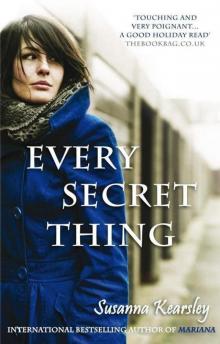 Every Secret Thing
Every Secret Thing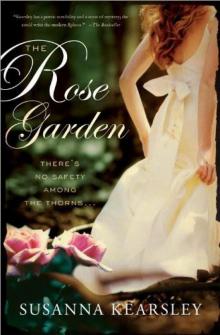 The Rose Garden
The Rose Garden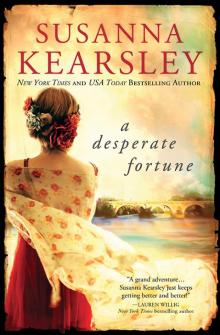 A Desperate Fortune
A Desperate Fortune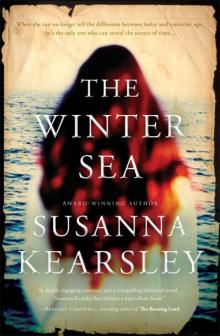 The Winter Sea
The Winter Sea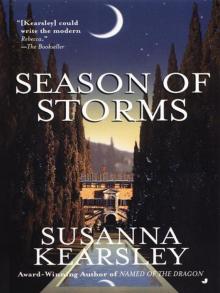 Season of Storms
Season of Storms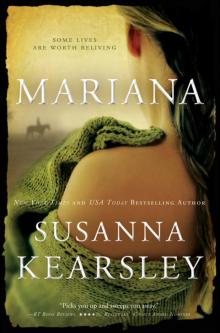 Mariana
Mariana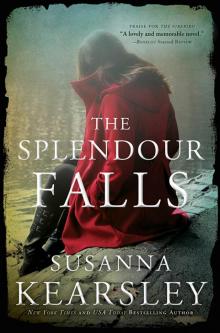 The Splendour Falls
The Splendour Falls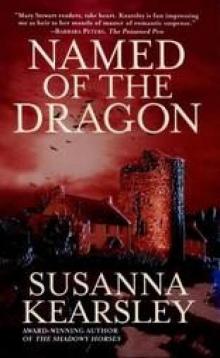 Named of the Dragon
Named of the Dragon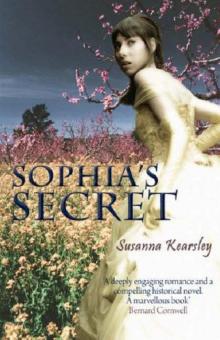 Sophia's Secret
Sophia's Secret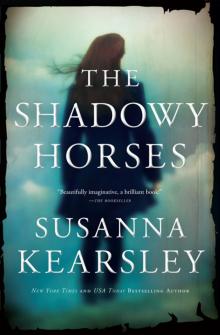 The Shadowy Horses
The Shadowy Horses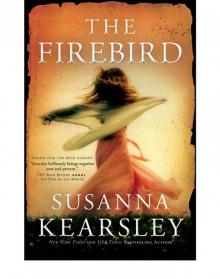 The Firebird
The Firebird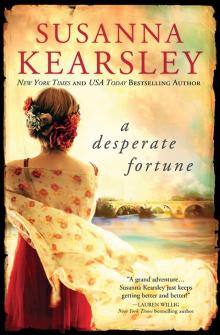 Desperate Fortune
Desperate Fortune